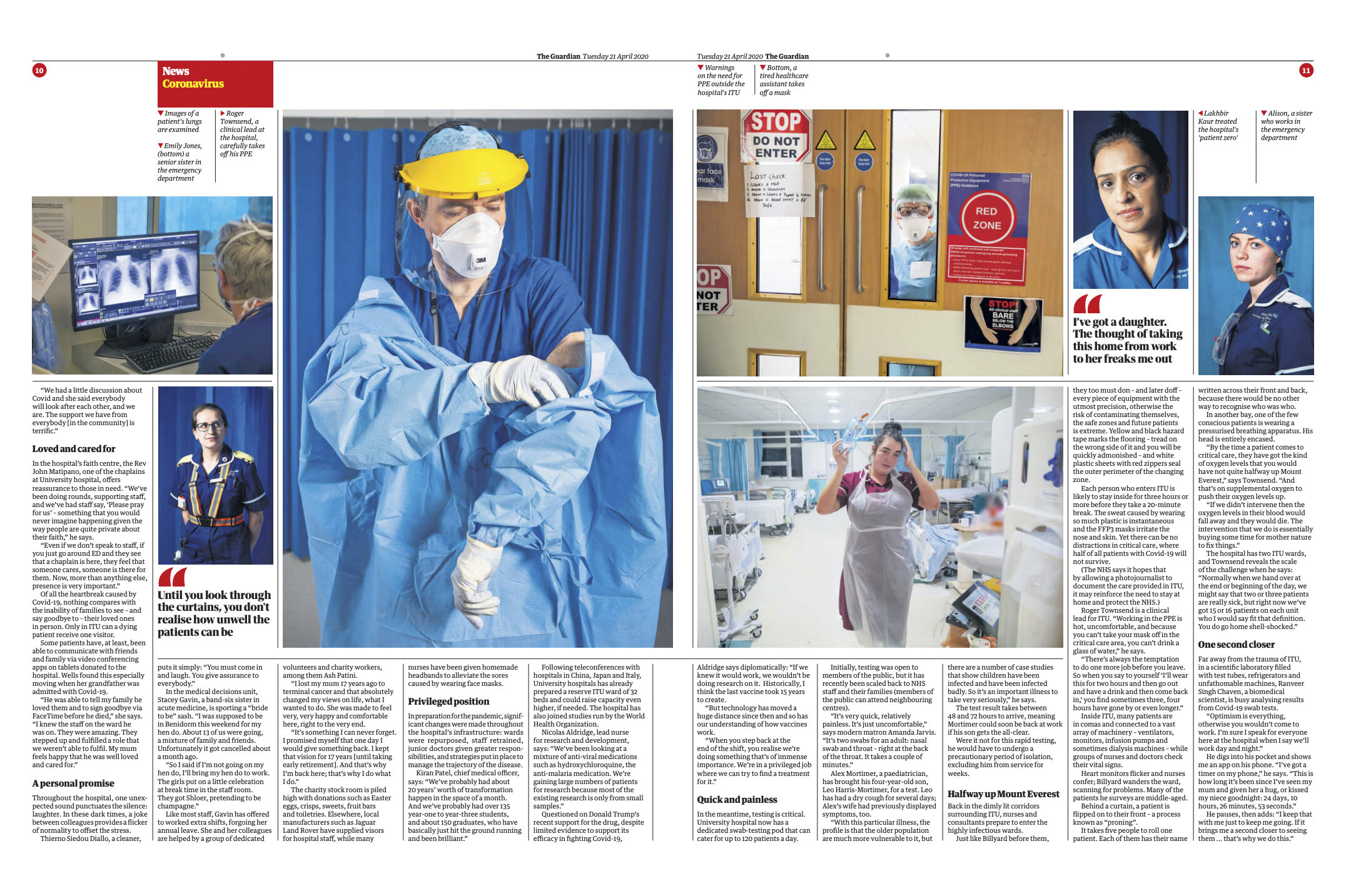SPECIAL REPORT: LIFE AND DEATH IN THE NHS AS COVID-19 HITS THE UK
“We’re used to death – death is part of life in intensive care – but not in the kind of numbers that we’re seeing, and that’s really quite hard to take,” says Tom Billyard, a consultant at University hospital in Coventry, as he reflects on the unprecedented challenges of the Covid-19 pandemic.
In preparation for his latest 12-hour shift in ITU, where the worst affected patients are given life support, Billyard begins to don several layers of personal protective equipment (PPE) over his blue scrubs. First a pair of latex gloves, then a surgical hat. Next a full-length gown tied together at the rear, followed by an additional pair of latex gloves which are meticulously taped on to the sleeves for extra security.
Finally, an FFP3 mask, which grips his face so tightly it will leave red marks across his cheeks, and a yellow-rimmed plastic visor to provide a secondary barrier against the disease. “I feel trepidation,” he says softly, before entering. “There’s a load of patients in there and I don’t know if they’re going to survive this.”
Billyard is one of more than 9,000 employees at the hospital, all of whom – porters and nurses, cleaners and chaplains, consultants and volunteers – have a vital role to play in the treatment of patients and the functioning of the hospital.
Emily Jones, a senior sister in the emergency department (ED), works on the hospital’s frontline. “ED is usually quite noisy,” she says. “But that’s not the case now – you don’t see the patients immediately, until you look through the curtains, and then you realise quite how unwell they can be.
“We’ve had everything from patients who have self-presented at the door saying: ‘I’ve had a cough for a few days,’ to people who have walked up the stairs to get to the emergency department and can barely hold a sentence with you. We’re also getting crews bringing in patients of various ages who are struggling to get breaths while they’re on oxygen.”
The West Midlands is one of the UK’s most affected regions. At the time of writing, University hospital has admitted 568 patients with Covid-19 and recorded 161 deaths from it, while 316 patients have been discharged after making full recoveries. It has transferred its minor injuries unit to a neighbouring hospital within the Trust, allowing it to prioritise the influx of Covid-19 patients.
“Wow,” Jones says, pausing at the severity of the symptoms she’s treating. “The acuity of our patients has gone up so much. They are so much sicker than we previously saw.”
A blizzard of healthcare staff whirls around her – some reading patient notes, others making telephone calls, washing hands, cleaning everything in sight and, heartbreakingly, placing a picture of a dove on to the door of one of the patients. “That’s to show they’re on the end-of-life care pathway,” a nurse explains. “It means we should give them peace.”
Patients who present with less life-threatening difficulties are often transferred to the respiratory wards on level three for round-the-clock care. There, the eerie silence continues. With no families visiting and the corridors all but empty, it feels like a ghost hospital.
University hospital currently has 84 Covid-positive patients, 12 of whom are in ITU, with 72 designated “query Covid” who are yet to be tested. Some lie in isolation rooms, texting friends and loved ones, others in wards of six beds; many seem in a state of shock and weariness, barely registering the world around them.
Mark Anders, a local paramedic, was himself struck down by Covid-19. “We all joked about going to emergency coughs and high temperatures, because that’s all we were going to.”
He fell ill during a Saturday night shift. “I got halfway through the shift and I said to my crew mate: ‘I don’t know what it is; I just don’t feel right,’” he says.
“Then I got home and the temperature started. I had a week at home of self-isolating, looking after myself, taking paracetamol every four hours, fluids, just trying to do everything to keep my temperature down. After a week I couldn’t control it. From there on: nightmare.”
Anders was lucky. As doctors readied him for transfer to ITU, his body began to fight back. Sitting in his pyjamas and still bearing bloody scars around his septum from the oxygen supply that kept him alive, he has been told he can soon return home to his family.
“Massive,” he says, when asked about the value of the NHS. “It’s the first time I’ve been this ill in my life. They have been brilliant.”
The first case of Covid-19 in Coventry was on ward 50, the renal ward. Lakhbir Kaur, known to her colleagues as Lacky, has been a sister there for five years. She treated Coventry’s “patient zero” and has watched with concern as the virus has spread through the local community. She fears that it may also transition from patients to staff.
For much of her shift, she wears only an apron, gloves and surgical mask – the kind you would find in a dentist’s surgery.
“It’s scary,” she says. “Our masks already have an expiry date on them and the NHS have covered up the existing expiry date with a further expiry date. What is that? Are they hiding something or are they legitimately tested?
“Infection control have said they have been retested [and are fit for purpose] for another 10 years. I’m wary about that. I really am. I’m a single parent – I’ve got a daughter. She’s the thing I live for. The thought of taking this home from work to her freaks me out.”





